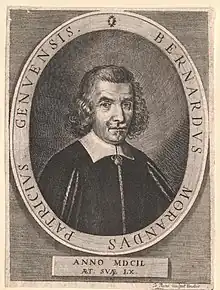Bernardo Morando | |
|---|---|
 Portrait of Bernardo Morando | |
| Born | 18 April 1589 |
| Died | 6 March 1656 (aged 66) |
| Occupations |
|
| Spouse |
Angelica Bignami
(m. 1612; died 1651) |
| Children | 13 |
| Writing career | |
| Language | Italian language |
| Period | |
| Genres | |
| Literary movement | |
| Notable works | La Rosalinda |
Bernardo Morando (18 April 1589 — 6 March 1656) was an Italian lyric poet, novelist and playwright.
Biography
Born in Sestri Ponente into a wealthy family of merchants, he worked in commerce in Piacenza, where he had the Dukes of Parma as a patron.[1] On 9 January 1612 he married Angelica Bignami, by whom he had 13 children, 4 of whom died in infancy. After his wife's death, he took holy orders. He had a major success, with his novel La Rosalinda (1650), which tells of Rosalinda, a young Catholic girl in London after fleeing religious persecution with other Catholics including Lealdo a man she is in love with.[1] He also wrote about other Mediterranean adventures including shipwrecks, pirates and slavery.[2] The novel, considered "a masterpiece of psychological penetration",[3] was a huge success and enjoyed over twenty reprints.[2] It was translated into French by Gaspard-Moïse-Augustin de Fontanieu (Grenoble 1730; Hague [Paris] 1732).[4] An English translation of the French version was published in London in 1733.[5]
Morando was a member of the Accademia degli Addormentati of Genoa and of the Accademia degli Incogniti of Venice and corresponded with Claudio Achillini, Anton Giulio Brignole-Sale, Gabriello Chiabrera, Angelo Grillo, Giovanni Vincenzo Imperiale, Agostino Mascardi and Fulvio Testi.[4] He died in Piacenza on 6 March 1656.[4]
References
- 1 2 Capucci 2002.
- 1 2 Bondanella, Peter; Ciccarelli, Andrea, eds. (2003). The Cambridge Companion to the Italian Novel. Cambridge University Press. p. 30. ISBN 9780521669627.
- ↑ Brand, Charles Peter; Pertile, Lino, eds. (1996). The Cambridge History of Italian Literature. Cambridge University Press. p. 321. ISBN 9780521434928.
- 1 2 3 Matt 2012.
- ↑ Rosalinda, a Novel. Containing the Histories of Rosalinda and Lealdus, Dorisba and Leander, Emilia and Edward, Adelais [...], and Alerames [...] With a most remarkable Story of Edmund, the gallant Earl of Essex [...] Intermix'd with a Variety of the most allecting Scenes, both of Distress and Happiness. By a Man of Quality Translated from the French. London: printed for C. Davis and sold by John Osborn. 1733.
Sources
- Capucci, M. (2002). "Morando, Bernardo". The Oxford Companion to Italian Literature. Oxford University Press. ISBN 978-0-19-818332-7. Retrieved 17 June 2023.
- Matt, Luigi (2012). "MORANDO, Bernardo". Dizionario Biografico degli Italiani, Volume 76: Montauti–Morlaiter (in Italian). Rome: Istituto dell'Enciclopedia Italiana. ISBN 978-8-81200032-6.
External links
- Aprosio, Angelico (1673). Biblioteca aprosiana. Bologna: Manolessi. pp. 547–553.
- «Bernardo Morandi Genovese». In : Le glorie de gli Incogniti: o vero, Gli huomini illustri dell'Accademia de' signori Incogniti di Venetia, In Venetia : appresso Francesco Valuasense stampator dell'Accademia, 1647, pp. 84–87 (on-line).